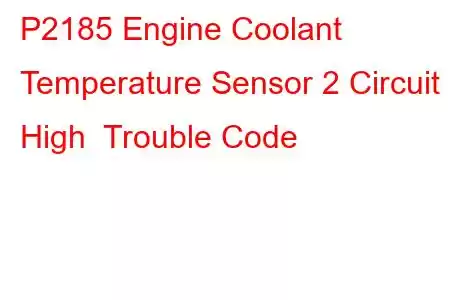P2185 Engine Coolant Temperature Sensor #2 Circuit High Input
OBD-II Trouble Code Technical Description
Engine Coolant Temperature Sensor #2 Circuit High Input
What does that mean?
This diagnostic trouble code (DTC) is a generic powertrain code, which means that it applies to all 1996-newer vehicles (VW, Ford, Dodge, Chevrolet, etc.). Although generic, the specific repair steps may vary depending on make/model.
The engine coolant temperature (ECT) sensor is a thermistor screwed into a coolant passage in the cylinder head. Sensor resistance is high when coolant temperature is low and resistance drops when coolant temperature increases.
The powertrain control module (PCM) provides a 5 volt reference and a ground to the sensor. The PCM monitors voltage drop to determine coolant temperature. If the ECT reads less than freezing temp. when engine has been running for more than a few minutes, the PCM determines a circuit fault and sets this code. Or if the PCM determines the sensor resistance is out of specs, this code is set.
An example of an Engine Coolant Temperature ECT sensor
Note: This DTC is basically identical to P0118, however the difference with this code is that this refers to the #2 ECT sensor circuit. So vehicles exhibiting this code means they have two ECT sensors. Be sure you are diagnosing the correct sensor circuit.
Potential Symptoms
Symptoms of a P2185 could include:
Very poor fuel economy A no start condition Vehicle may start, but run very poorly, blowing black smoke, running very rough and misfiring Illumination of MILCauses
A code P2185 may mean that one or more of the following has happened:
A bad connection at the #2 ECT sensor An open in the ground circuit between the #2 ECT sensor and the PCM A short in the voltage feed between the sensor and the PCM A bad PCM (less likely) A bad temperature sensor (shorted internally)Possible Solutions
First, if you have access to a scan tool, check the reading of the #2 coolant sensor. Does it read a logical number? If so, the problem is likely intermittent. Perform a "wiggle" test by wiggling the connector and harness to the sensor while watching the reading on the scan tool. Watch for any drop-outs. Drop-outs would indicate a bad connection. If the scan tool reads an illogical temperature, check the resistance of the temperature sensor. If it is out of specs, replace it. If it is in specifications, unplug the sensor and, using a fused jumper wire, jumper the two terminals of the connector together. The temperature reading should now be maxed out to above 250 degrees F. If not, there is likely a problem with the ground circuit or voltage supply.
Check for 5 volts reference voltage at the connector. Also check for ground presence at the connector. If you do not have 5V ref. and/or ground continuity, check for these back at the PCM connector. If you have these at the PCM connector, then repair open or short between the PCM and the sensor. If you do not, remove the offending wire from the PCM and then check for proper voltage at the PCM pin. If it's present now, repair short on the circuit. If it isn't present after removing the wire and checking the pin, replace PCM
NOTE: Usually, P2185 is indicative of a bad temperature sensor, but doesn't rule out these other possibilities. If you're unsure of how to diagnose a PCM, do not attempt.
Related ECT sensor circuit codes: P0115, P0116, P0117, P0118, P0119, P0125, P0128, P2182, P2183, P2184, P2186
Read: 25


